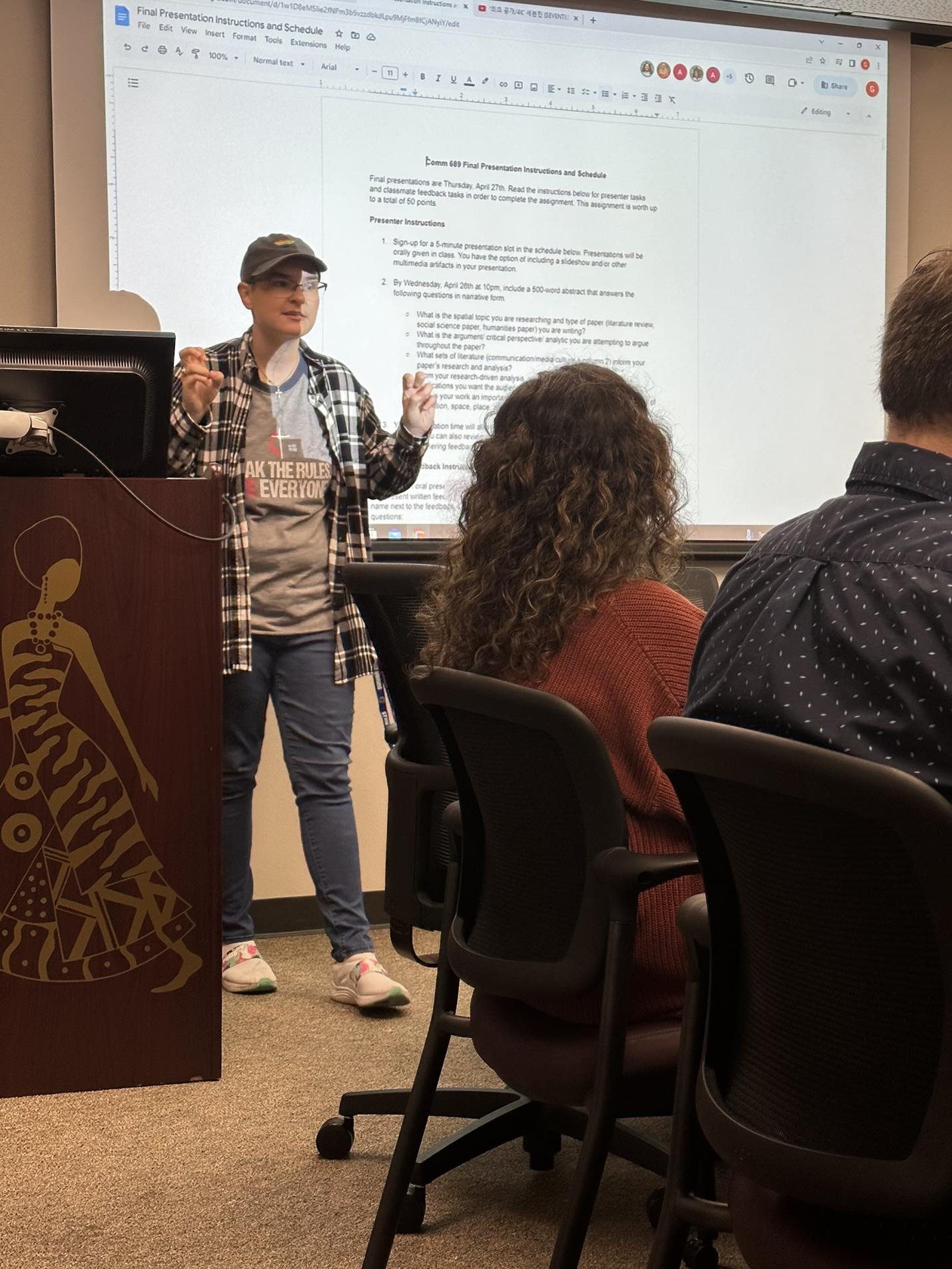February 2024

Three Reasons to Attend Job Talks: A Lesson in Good Department Citizenship
By Delaney Couri
If your program is anything like mine, then during your time in graduate school you have probably experienced at least one, if not more, job talks.
So, what is a job talk? Job talks can be given in many different formats and for many different positions, but the general overview is that job talks are given by candidates hoping to be hired by an institution. Generally, they cover either research or teaching skills, and oftentimes they cover both. I have been to job talks with candidates I knew and those I did not. Job talks with candidates who were coming straight from doctoral programs of their own and ones with faculty members from other institutions looking to make a change. With each job talk comes a few reminders from my department…
- First rule of job talks; we don’t talk about job talks.
- You must attend the job talk or else you make everyone look bad.
- You must attend the job talk or else karma will hit and no one will attend YOUR job talk when you graduate.
Anyone who read the news this past summer surrounding my department knows the hazards, risks, and processes related to hiring. That particular debacle aside, I do think job talks are worth talking about. But I will also keep the majority of this post fairly vague, not revealing when I attended talks or identities of candidates based on the ethical principles mentioned before.
The second and third reminders are what I want to focus on from here on out because frankly, they annoy me. There is no better way to get me not to comply than by telling me I have to do something. I am not someone who takes “Because you have to/should” as a good enough rationale to behave a particular way, so when members of my department tell me that job talks are important because they make the department look bad if I am not there, I think that reasoning is a bit weak. Sure, I want to be a good department citizen, but getting me to attend by using shame based tactics gets under my skin. Particularly the third reminder, which seems outright cruel and a bit ridiculous. So, as someone who considers themself an average department citizen,* I decided to write up my own list of why I think graduate students should attend job talks.
Listed here in no particular order are some reasons that are asset and reward based rather than deficit or punishment based as to why graduate students should attend job talks.
1. It will help your own teaching/research.
I once attended a job talk for a position that I thought had very little to do with my teaching or research career. I went out of guilt, obligation, and the offer of a free lunch. What I walked away with (in addition to the free lunch) was a piece of research that I was able to use that very same day when teaching my students. The job talk made me a better teacher and dispelled some of my biases around research that looks different than my own. Additionally, I have attended more than one job talk where I scribbled a particular theory onto a piece of paper only to go back later and rely on that theory heavily in my own work. Job talks are given for a purpose (to procure employment), but at their core they are very much like free conference presentations, providing ideas, theories, and frameworks to the audience in the same way that the audience provides feedback to the presenter.
2. It will give you skills necessary to know how to create your own job talk.
There was a time where I attended three job talks in the span of one week. One was excellent, one was fine, and one was abysmal. What was the difference between these three? What made one candidate so likable and another so, well, not? I think there are many answers to this question, but based upon conversations with my peers, it had to do with pacing, visuals, interactivity, and emphasis on teaching. As someone who had considered joining the academic market post-graduation, I had no idea what made a job talk successful until I saw an example of a good and bad job talk. If you are even remotely considering academia, attending job talks in your field will help you make a list of criteria the way I did that you can use to frame your own future job talk.
3. It will give you hope.
Scholars, like people, are just generally very nice, funny, and cool-- if you are feeling down about the state of the world, going to a job talk may just remind you that not everything in the world is sad/hard/difficult. Now, this is not always the case, often job talks center around research and research can be on very heavy topics. However, particularly in a social scientific or humanities field like my own, research often is focused on making the world a better place to live in and interacting with like-minded individuals during a Q+A session is a great way to feel okay again. In one of the job talks I attended (the one with the free lunch), I had just as much fun talking to the candidate about life as I did research, and their work gave me hope that there are other people out there who want to see a happier, healthier world just like I do.
If these reasons are not enough to pique your interest in attending the next job talk announcement that comes through your email, then worry not-- I am sure your advisor will have plenty of thoughts about why you MUST attend… but if you are looking for a reason to go that is not just “BECAUSE IT MATTERS,” I hope that you reread my list and find something you can take away at your next elective (compulsory?) job talk.
*Admittedly, I like to ask what my department can do for me more than what I can do for my department, so, take that as you will.
